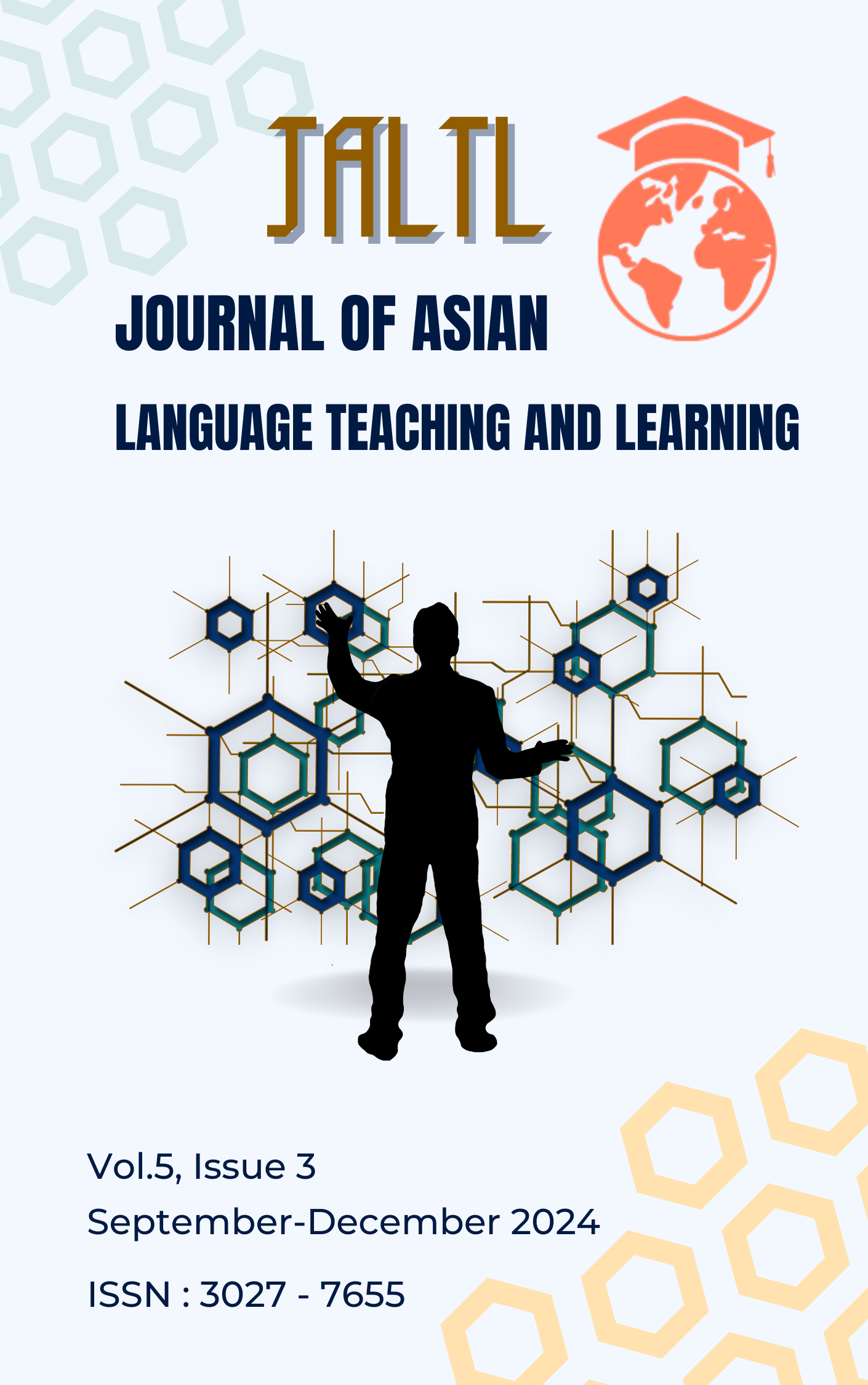“Hybrid Learning” English Virtual Classroom
Main Article Content
Abstract
The objectives of this research are as follows: 1) to study the model of English language learning through a virtual online system, 2) to design English learning through a virtual online system, and 3) to provide guidelines for developing innovative English language learning through a virtual online platform. Documentary research looked at documents about hybrid learning and virtual English classrooms. Qualitative research included in-depth interviews with 16 participants and a focus group with 9 participants. And action research collected data from 50 students who took part in hybrid learning virtual English classrooms to compare activities before and after they were put into place.
The research findings are as follows:
1) The examining the model for virtual English language learning, it was found that effective virtual classrooms involve simultaneous engagement of teachers and students, emphasizing flexibility and content accessibility. The model encourages incorporating engaging instructional media and activities suited for screen-based learning, setting clear objectives for each lesson, and using flexible assessment methods. Additionally, it promotes accessible, participatory learning where students can review recorded lessons, engage in group activities, and interact in simulated virtual scenarios.
2) In designing virtual English language learning, teachers defined clear learning objectives to align lesson plans and activities with desired skills, considering students' backgrounds and needs. Teachers structured the curriculum sequentially from simple to complex, utilizing interactive activities to foster participation. The virtual English classroom design helps students practice skills in settings similar to real-life situations, focusing on engagement and interaction, with various language-learning methods, such as chats, video conferencing, and simulations.
3) The development of innovative virtual English learning: observations of the 50 participants before and after activities showed minimal differences. However, participants actively engaged in online activities and demonstrated interest in learning. The activities fostered knowledge acquisition, enhancing students' understanding and desire for more similar activities. The curriculum was adjusted based on student feedback and needs to include more engaging activities and create a pressure-free environment for learners.
Article Details

This work is licensed under a Creative Commons Attribution-NonCommercial-NoDerivatives 4.0 International License.
References
Juirat Laksanasiri. (2005). Language and Communication. Bangkok: Faculty of Arts, Silpakorn University.
Juthaporn Pharaphob and Thitinart Kamyod. (2015). A Study of English Language Use Patterns for Communication by Quality Tourism Service Providers in Satun Province. (Research Report). Faculty of Arts: Rajamangala University of Technology Srivijaya, Songkhla.
Krasirin Rattanasupha. (2023). Smart classrooms and educational technology in the digital age. [Online]. Retrieved From:
https://www.senate.go.th/view/1/article_detail/academic document from academic section/7387/TH-TH.
Methavee Tanwatthanapong and Wisarut Changsiriku. (2014). A study on the level of fear in English conversation among nursing students at Rajathanee University. The 2nd National Academic Conference of Phuket Rajabhat University: 2014, May 8-9, 2014. Phuket Rajabhat University.
Naowanit Songkram, and Thanat Somanakup. (2017). Development of a Virtual Smart Classroom System to Promote 21st Century Learning Skills in Learning and Innovation for Higher Education Students. (Research Report). National Research Council of Thailand (NRCT) and Thailand Research Fund (TRF).
Nattanee Ritthirat. (2015). The ability to speak English and the problems in developing English speaking skills of university students (Master of Arts thesis in Teaching English as an International Language). Prince of Songkla University.
Oranya Bamrung. (2015). Strategies for Speaking English for Communication among High School Students: A Case Study of Udomsuksa Demonstration School, Chonburi Province. Master of Arts in English for Communication. Faculty of Humanities and Social Sciences: Burapha University.
Patcharaporn Rattanaworapas. (2012). The Condition and Problems of Teaching Management in the Course ENG321 English for Mass Communication, Business English Major. (Research Report). Bangkok: Sripatum University.
Phuchit Sattapong. (2023). Smart Classroom: Educational Innovations in the 21st Century. [Online]. Retrieved From: https://eportfolio.dusit.ac.th.
Siriporn Apivongsngam. (2006). A Study of Virtual Classroom Design Approaches Based on Constructivist Concepts (Master of Fine Arts Thesis in Communication Design). Graduate School: Silpakorn University.
Thanawat Arunsuksawang. (2014). Factors Affecting the Ability to Use English According to 21st Century Learning Skills of Grade 12 Students in the Secondary Education Area of Bangkok Metropolitan Region 2 to Prepare for the ASEAN Community (Master's Thesis in Educational Development). Graduate School: Silpakorn University.
Theeraporn Plailak. (2011). Factors Affecting the English-Speaking Skills of Second-Year Students in the English Program, Faculty of Education, Rajabhat University in the Bangkok Area. Research and Development Journal, Suan Sunandha Rajabhat University, 3(3), 52-58.
Vorapan Yaemhongpapha. (2019). Social Communication for Developing the Learning Process of Buddhist Organizations. Mahachulalongkornrajavidyalaya University Journal, 6(Special Issue), 182-200.


